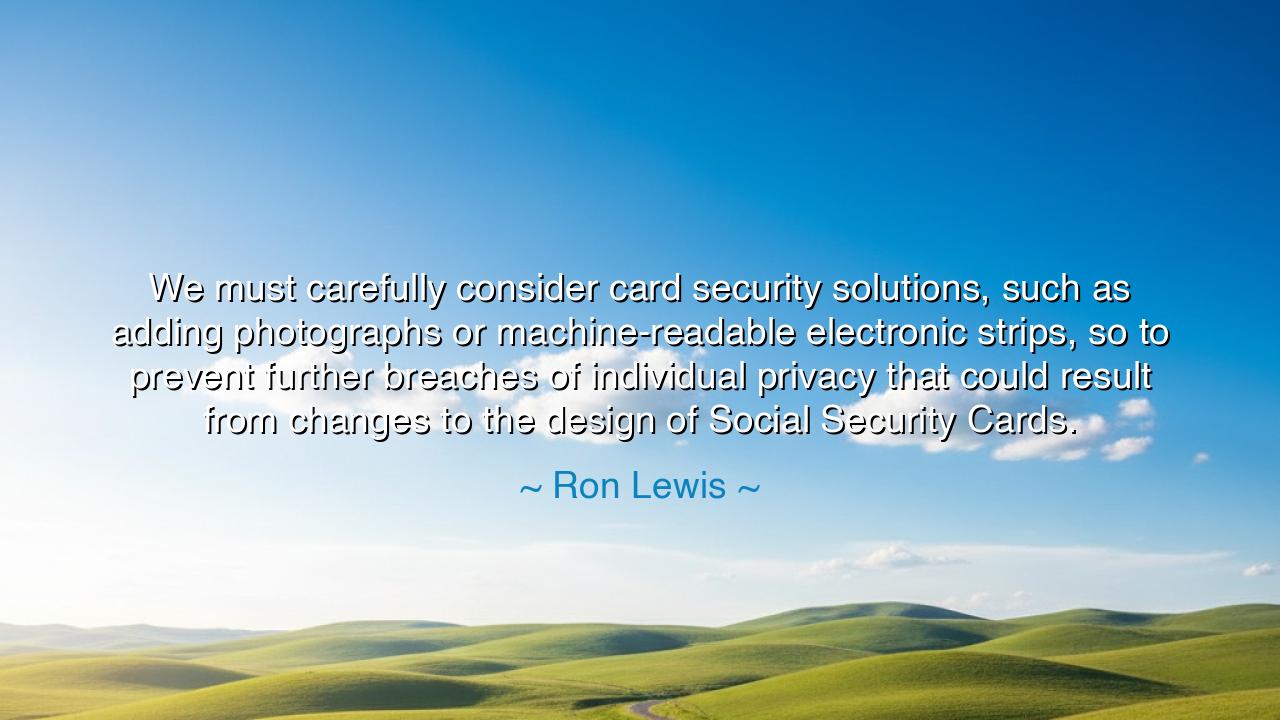
We must carefully consider card security solutions, such as
We must carefully consider card security solutions, such as adding photographs or machine-readable electronic strips, so to prevent further breaches of individual privacy that could result from changes to the design of Social Security Cards.






In an age of invisible currents and silent data, where identities travel through unseen channels and the shadows of information stretch across the earth, Ron Lewis spoke words of both warning and wisdom: “We must carefully consider card security solutions, such as adding photographs or machine-readable electronic strips, so to prevent further breaches of individual privacy that could result from changes to the design of Social Security Cards.” Though these words are rooted in the language of governance and technology, their spirit is ancient — a reminder that power and trust must always walk hand in hand, and that to protect a society, one must guard not only its borders, but also the dignity of its citizens.
Lewis’s quote arises from a time when the world began to shift into the digital age — an era when the fragile boundaries of privacy were tested by innovation. The Social Security Card, once a simple token of identity, became a key to vast networks of data — health records, finances, citizenship, and the very fabric of a person’s existence. In speaking of “security solutions,” Lewis was not merely urging better technology; he was calling for wisdom in progress, for the balance between advancement and restraint. For what use is innovation if it strips away the sanctity of the human soul? What value has a system if it grants efficiency at the cost of trust?
This truth, though modern in its form, is as old as civilization itself. In the great city of Athens, where democracy first took root, the elders warned against granting too much power to any one institution without the safeguards of accountability. Even then, they understood that liberty must be defended not only from swords, but from secrecy. The philosopher Solon, in crafting the first laws of the city, knew that laws could become cages if not tempered with justice — just as identification and surveillance, if left unchecked, could become the tools of control rather than protection. Lewis’s words echo this same principle: that the preservation of identity must never yield to the machinery of convenience.
In his caution, there lies compassion. To speak of individual privacy is to defend the unseen sanctuaries of human life — the thoughts, choices, and vulnerabilities that make each person sacred. In a world where data flows more freely than truth, where faces can be copied, signatures forged, and lives digitized, the line between safety and exposure grows thin. Lewis saw that every new design — every machine-readable strip, every photograph embedded in plastic — carried within it both promise and peril. He urged that the guardians of such systems must not be swept away by the excitement of progress, but must act as the wise stewards of trust.
Consider, too, the lessons of history’s unguarded moments. When the printing press was born, knowledge spread — but so did propaganda. When the telegraph connected nations, it also carried the whispers of spies. When the first computers stored names and numbers, it was believed they would make life simpler; yet in their circuits, new dangers awoke. Every invention, from fire to electricity, has carried both creation and destruction within it. The wise, therefore, have always asked not “Can we build it?” but “Should we build it — and how shall we protect what is sacred?”
Lewis’s words remind us that design is never neutral. The architect who builds a temple must consider not only its walls, but its soul. So too must the designer of identity systems consider the moral structure behind the material one. The issue of card security is not about cards alone — it is about the relationship between the individual and the state, between privacy and power, between freedom and fear. To ignore such balance is to invite chaos; to respect it is to build civilization upon the foundation of trust.
And so, O listener of future ages, take this teaching to heart: guard not only your possessions, but your identity. Demand of progress not only innovation, but integrity. When new systems arise promising speed and security, ask instead whether they honor the dignity of the human soul. For technology, though mighty, is only as righteous as the minds that wield it. Let your own designs — whether of machines, institutions, or lives — reflect both wisdom and compassion. In this way, you will preserve not just privacy, but the sanctity of personhood itself.
Thus, the lesson of Ron Lewis endures: the future must be built not with haste, but with careful consideration. Every invention must protect as well as empower. Every design must serve both progress and principle. For the truest civilization is not the one that moves fastest, but the one that guards the light of its people while walking forward into the unknown.






AAdministratorAdministrator
Welcome, honored guests. Please leave a comment, we will respond soon